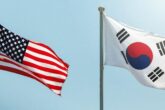January 12, 2019
It's Time for the U.S.-South Korea Alliance to Evolve
The alliance between the United States and South Korea has, for the past six decades, been a core pillar of the U.S.-led security architecture in Northeast Asia—but in recent months, the bilateral relationship has been facing something of a crisis of confidence. Though the alliance is broadly integral to maintaining a balance of power favorable to the region’s democracies, functionally, its nearly singular focus on managing the North Korea challenge bears fundamental risks.
In 2018, the breakneck pace of inter-Korean rapprochement and the failure to reach a timely agreement on the United States and South Korea’s military cost-sharing framework, the Special Measures Agreement , nudged the alliance toward a new inflection point. These developments have caused alarm in some quarters about Seoul going its own way, balancing between great powers, as portended in President Moon Jae-in’s August 2018 Liberation Day Speech . But they should also be seen as an opportunity to inject new vitality into the bilateral relationship. U.S. officials have urgent cause to work with their South Korean counterparts toward an elevated vision of the alliance—one that transcends exclusive orientation around North Korea and a transactional, cost-driven view of burden-sharing. As Seoul adopts more globally oriented policies, the United States should parlay these efforts into a more concrete role for South Korea in the United States’ Free and Open Indo-Pacific Strategy.
Read the full article and more in The National Interest.
More from CNAS
-
Trump-Lee Summit
Duyeon Kim, adjunct senior fellow at the Center for a New American Security joins CNN to discuss the Trump-Lee Summit and the concerns should U.S. troops pivot to focus on Chi...
By Dr. Duyeon Kim
-
Upcoming Trump-Lee Summit: Modernizing the Alliance by First Reaffirming Long-Standing Principles
Trump and Lee could reaffirm their country’s commitment to the alliance amid shifting security dynamics and agree to modernize it in broad terms to meet the needs of today and...
By Dr. Duyeon Kim
-
South Korea-U.S. Launch Ulchi Drills as Kim Slams Exercise as “Hostile”
With North Korea's growing alignment with Moscow, plus renewed great-power diplomacy following President Trump's latest call with President Putin, the Korean Peninsula is once...
By Dr. Go Myong-Hyun
-
Indo-Pacific Security / Energy, Economics & Security
75 Years Post-Korean War: Can Trust Be Rebuilt Under the New Administration?As President Lee Jae Myung begins his term, he's taking visible steps to reset the tone with North Korea: halting propaganda broadcasts and reemphasizing past military agreeme...
By Dr. Go Myong-Hyun



